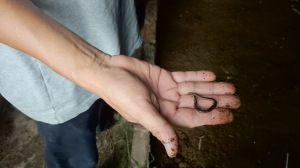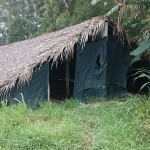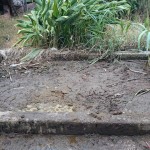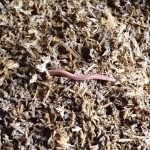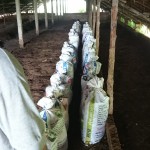Last week, the Fablab Saigon team went to visit M. Tuấn from the An Phu earthworm farm. there are quite a lot of information on his website already, but nothing is like going there, see and, for the most daring, touch the worms and have M. Tuấn telling his story.
The farm is about 1h drive from Ho Chi Minh city, very close to the patriotic soldiers cemetery in Cu Chi. In this area, there are no tap water, people use well water. But there is electricity and 3G 🙂
M. Tuấn explained his technique to grow earthworms. The species he rears is the Perionyx Excavatus, also known as the Malaysian or Indian blue worms. This type of worms are smaller than the worms we see in our gardens, they live on the surface, they are very fast growing and breeding and suit well to tropical climate. More details on the various types of worms here.
- A house for worm
- Basin of cowdung
- The blue worm
- Compost from the worms
- The FablabSG crew
The ecosystem he builds is quite amazing: he rears milk cows, he exclusively feeds the worms with cowdung and the worms live in nearby rubber plantations. The region is well known for the rubber plantations and milk cows. He rears the worms not for composting as we usually see in other countries, but to harvest them to produce food for poultry, pig and fish. He also sell the compost 50% for plantations and 50% for fish and shrimp ponds, but the compost has much less value than the worms themselves. It seems that he showed his technique to other businesses in the region with access to cows and rubber and they sell him back their worm production. He keeps secret the way he transform the worms into food, and make money out this main business.
When we told him about our project for a worm bin, he said that he tried about 5 years ago, but that it was too much time consuming for him: worm bins were more recreational for him, and couldn’t be his core business. However he said that if we managed to build a successful vermicompost bin in Vietnam, he would give us all the name of the people who contacted him in the past hoping to use earthworms to process green waste. He recommended us to start with eggs and to go very slowly, so that the worms can get use to their environment. He told us that the adult worms of this species are almost impossible to move, and that maybe we should also seek another species of worm, the Eisenia Fetida, which is more common for vermicomposting.
He told us the story of the HR director from a big group who pour quite a lot of money in a similar project (and failed) and also the story of the man who had to sell his house because of earthworms… But that shouldn’t stop us from trying! The Fablab has no ambition of opening a worm farm, but earthworms sound like a yet untapped great source of clean nutriment for animal rearing and for clean composting. After this visit, it feels like there is a lot to do in this area.
The Fablab actual target is to provide small scale in-house clean and easy vermicomposting for households in Vietnam so that they can grow some clean vegetables at home (or beautiful plants!).

